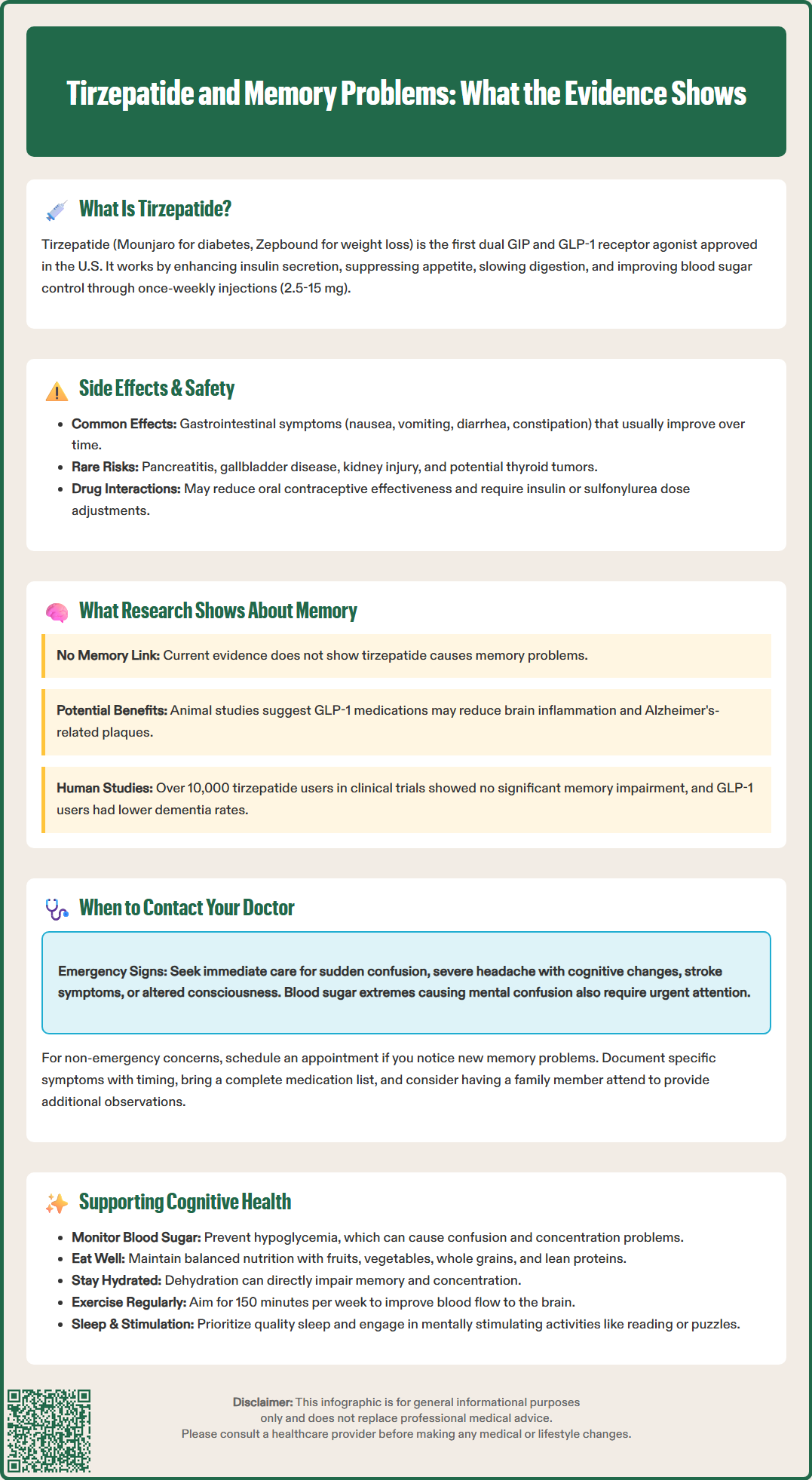LOSE WEIGHT WITH MEDICAL SUPPORT — BUILT FOR MEN
- Your personalised programme is built around medical care, not willpower.
- No generic diets. No guesswork.
- Just science-backed results and expert support.
Find out if you’re eligible

Tirzepatide (Mounjaro for type 2 diabetes, Zepbound for weight management) is a dual GIP/GLP-1 receptor agonist that has raised questions about potential cognitive effects. Current evidence does not establish a link between tirzepatide and memory problems. Clinical trials involving over 10,000 participants have not identified memory impairment as a significant adverse event. Emerging research suggests GLP-1 receptor agonists may actually offer neuroprotective benefits, though dedicated cognitive studies are needed. Understanding the relationship between metabolic medications and brain health helps patients make informed decisions and recognize when medical evaluation is warranted.
Quick Answer: Current evidence does not establish a causal link between tirzepatide and memory problems, and clinical trials have not identified cognitive impairment as a significant adverse event.
Tirzepatide is a novel medication approved by the FDA for the treatment of type 2 diabetes (marketed as Mounjaro) and chronic weight management (marketed as Zepbound). For weight management, it's indicated for adults with a BMI ≥30 kg/m² or ≥27 kg/m² with at least one weight-related comorbidity. Both products are adjuncts to diet and exercise. Tirzepatide represents a significant advancement in metabolic therapy as the first dual glucose-dependent insulinotropic polypeptide (GIP) and glucagon-like peptide-1 (GLP-1) receptor agonist available in the United States.
The medication works through a sophisticated dual mechanism. By activating GIP receptors, tirzepatide enhances insulin secretion and may improve insulin sensitivity in peripheral tissues. Simultaneously, GLP-1 receptor activation stimulates glucose-dependent insulin release from pancreatic beta cells, suppresses inappropriate glucagon secretion, slows gastric emptying, and reduces appetite through central nervous system pathways. This combined action results in improved glycemic control and substantial weight loss in clinical trials.
Tirzepatide is administered as a once-weekly subcutaneous injection, with doses ranging from 2.5 mg to 15 mg depending on therapeutic goals and tolerability. The medication is metabolized via proteolytic cleavage and β-oxidation with elimination primarily through peptide catabolism, with a half-life of approximately five days. Common adverse effects include gastrointestinal symptoms such as nausea, vomiting, diarrhea, and constipation, which typically diminish over time.
More serious but rare risks include pancreatitis, gallbladder disease, diabetic retinopathy complications, acute kidney injury from volume depletion, hypersensitivity reactions (including anaphylaxis), and potential thyroid C-cell tumors (based on rodent studies). The FDA label includes a boxed warning regarding thyroid tumors, contraindicating use in patients with a personal or family history of medullary thyroid carcinoma or Multiple Endocrine Neoplasia syndrome type 2. Tirzepatide is not indicated for type 1 diabetes and requires caution in patients with severe gastrointestinal disease. When used with insulin or sulfonylureas, dose adjustments of these medications may be needed to reduce hypoglycemia risk. Tirzepatide may also reduce the effectiveness of oral contraceptives during initiation and dose escalation.

Current scientific evidence does not establish a causal link between tirzepatide and memory problems. Preclinical and observational research suggests that GLP-1 receptor agonists may have potential neuroprotective properties, though these findings require confirmation in randomized controlled trials specifically designed to assess cognitive outcomes.
Preclinical research has demonstrated that GLP-1 receptors are widely distributed throughout the central nervous system, including regions critical for memory formation such as the hippocampus. Animal studies suggest that GLP-1 receptor activation may reduce neuroinflammation, decrease amyloid plaque formation, and enhance synaptic plasticity. Several observational studies in humans with type 2 diabetes have found associations between GLP-1 receptor agonist use and reduced risk of dementia compared to other diabetes medications. For example, a large retrospective cohort study published in Diabetes Care found that GLP-1 receptor agonist users had lower rates of dementia diagnosis compared to matched controls on other glucose-lowering therapies.
Regarding tirzepatide specifically, the SURPASS clinical trial program, which enrolled over 10,000 participants, did not identify memory impairment or cognitive decline as a significant adverse event. However, it is important to note that dedicated neurocognitive assessments were not primary endpoints in these metabolic trials, and the adverse event coding systems may not detect subtle cognitive changes. The FDA's post-marketing surveillance continues to monitor for potential cognitive effects as the medication's use expands.
Patients should understand that indirect effects of metabolic medications can influence cognitive function. Hypoglycemia, though uncommon with tirzepatide monotherapy, can cause acute confusion and, if severe or recurrent, may contribute to long-term cognitive concerns. Other factors that may affect cognition in patients with metabolic disorders include vitamin B12 deficiency (particularly in those previously on metformin), thyroid dysfunction, sleep apnea, and depression. Patients taking Zepbound for weight management should also be aware of the importance of monitoring for changes in mood or suicidal thoughts and reporting these promptly to their healthcare provider.
While there is no established connection between tirzepatide and memory problems, any new or worsening cognitive symptoms warrant medical evaluation. Patients should contact their healthcare provider promptly if they experience persistent forgetfulness, difficulty concentrating, confusion, disorientation, or changes in their ability to perform familiar tasks.
Seek immediate medical attention if you experience:
Sudden confusion or inability to recognize familiar people or places
Severe headache accompanied by cognitive changes
Memory loss following a fall or head injury
Confusion associated with chest pain, shortness of breath, or other cardiac symptoms
Altered consciousness or difficulty staying awake
Signs of stroke (FAST: Face drooping, Arm weakness, Speech difficulty, Time to call 911)
Blood glucose below 54 mg/dL with mental status changes
Very high blood glucose with confusion, excessive thirst, frequent urination, abdominal pain, or fruity breath odor (signs of diabetic ketoacidosis or hyperosmolar state)
For non-emergency cognitive concerns, schedule an appointment with your primary care physician or endocrinologist to discuss symptoms in detail. Your doctor will likely perform a comprehensive assessment including medication review, as numerous drugs can affect cognition. They may check blood glucose levels to rule out hypoglycemia or hyperglycemia, both of which can impair mental function. Laboratory testing may include thyroid function, vitamin B12 levels, complete blood count, and metabolic panel to identify reversible causes of cognitive symptoms.
It is essential to provide your healthcare team with a complete picture. Bring a list of all medications, supplements, and over-the-counter products you are taking. Document specific examples of memory concerns, including when they started, their frequency, and any patterns you have noticed. If possible, have a family member or close friend accompany you, as they may observe changes you have not recognized yourself. Your physician may refer you to a neurologist or neuropsychologist for specialized cognitive testing if initial evaluation suggests significant impairment or if symptoms persist despite addressing potential contributing factors.
Maintaining optimal brain health while taking tirzepatide involves a comprehensive approach that addresses multiple aspects of metabolic and neurological wellness. The American Diabetes Association emphasizes that good glycemic control itself is protective against cognitive decline, making effective diabetes management a priority for long-term brain health.
Blood glucose monitoring remains important even though tirzepatide carries low hypoglycemia risk when used alone. Patients should be aware of hypoglycemia symptoms including confusion, difficulty concentrating, and irritability. If you are taking tirzepatide in combination with insulin or sulfonylureas, your doctor may need to adjust doses of these medications to prevent low blood sugar episodes that could affect cognitive function. For hypoglycemia treatment, follow the 15-15 rule: consume 15 grams of fast-acting carbohydrates, wait 15 minutes, and recheck blood glucose.
Nutritional considerations deserve attention during treatment. Ensure adequate intake of essential nutrients through a balanced diet rich in fruits, vegetables, whole grains, and lean proteins. The gastrointestinal side effects of tirzepatide may reduce appetite and food variety; working with a registered dietitian can help maintain balanced nutrition. Stay well-hydrated, as dehydration can impair concentration and memory. Discuss with your doctor whether testing for vitamin B12 levels is appropriate, especially if you previously took metformin.
Lifestyle factors that support cognitive health include regular physical activity, which improves cerebral blood flow and may enhance neuroplasticity. The American Diabetes Association and U.S. Department of Health and Human Services recommend at least 150 minutes of moderate-intensity aerobic activity weekly for adults. Prioritize sleep quality, as sleep deprivation significantly impairs memory consolidation and cognitive performance. Engage in mentally stimulating activities such as reading, puzzles, learning new skills, or social interaction.
Regular medical follow-up allows for ongoing assessment of both metabolic control and overall health. Discuss any concerns about memory or thinking with your healthcare team at routine visits. Your doctor can help distinguish between normal age-related changes, medication effects, and conditions requiring further investigation. Remember that optimizing cardiovascular risk factors—including blood pressure, cholesterol, and smoking cessation—protects both heart and brain health in the long term.
Current evidence does not establish a causal link between tirzepatide and memory problems. Clinical trials involving over 10,000 participants did not identify memory impairment as a significant adverse event, though dedicated neurocognitive assessments were not primary endpoints in these metabolic studies.
Contact your healthcare provider for comprehensive evaluation if you experience new or worsening cognitive symptoms. Your doctor will assess potential contributing factors including blood glucose levels, thyroid function, vitamin B12 status, and medication interactions that may affect cognition.
Preclinical research suggests GLP-1 receptor agonists may have neuroprotective properties, and observational studies have found associations with reduced dementia risk in patients with type 2 diabetes. However, randomized controlled trials specifically designed to assess cognitive outcomes are needed to confirm these potential benefits.
All medical content on this blog is created using reputable, evidence-based sources and is regularly reviewed for accuracy and relevance. While we strive to keep our content current with the latest research and clinical guidelines, it is intended for general informational purposes only.
This content is not a substitute for professional medical advice, diagnosis, or treatment. Always consult a licensed healthcare provider with any medical questions or concerns. Use of this information is at your own risk, and we are not liable for any outcomes resulting from its use.